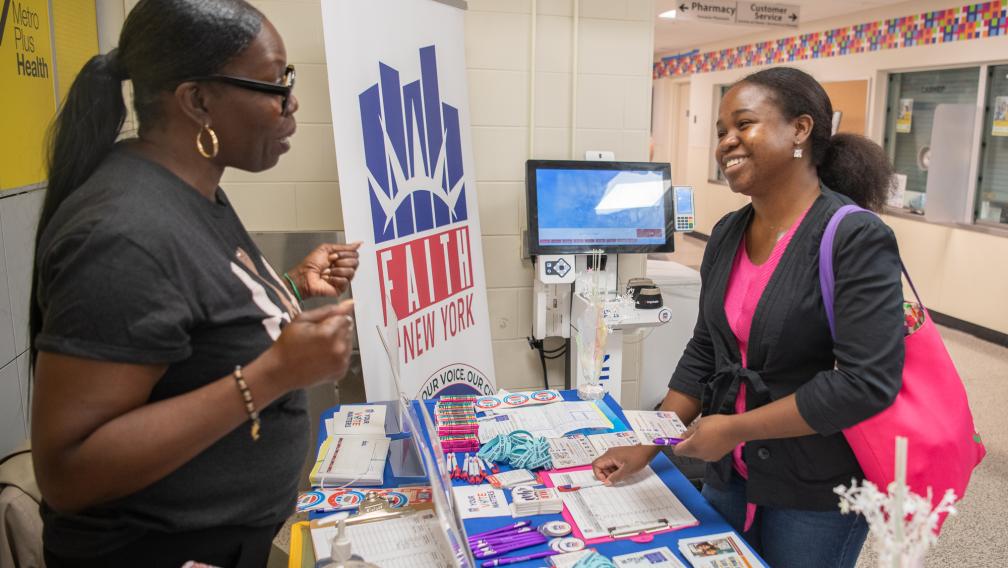Getting New Yorkers to the Polls

Trinity grantee GoVoteNYC is working with nonprofits to educate and empower voters across the city.
As executive director of Faith in New York, Crystal Walthall leads one of the nine nonprofits tapped by Trinity Church and other funding partners to increase voter turnout in New York City. Walthall has spent months talking to voters in low-income and minority communities, which see persistently low turnout. Some voters told Walthall they already had plans in place for Election Day, while others needed help finding a polling location or confirming their registration online.
And then there are New Yorkers like Charles,* a business owner who told Walthall that he simply refuses to vote.
Walthall met Charles in August, at a street fair organized by St. Matthew's Community AME Church of Hollis, Queens, whose pastor is a member of Faith in New York’s organizing network. When Charles approached her table and shared his opinion, Walthall asked him to explain. Charles expressed his frustration with the political climate and his disappointment that politicians weren’t focusing on the issues that mattered most to him — such as the price of getting around on the MTA. As they went over the topics he cared about, Walthall was able to translate political jargon and help Charles understand the importance of local elections. By the end of the 25-minute conversation, Charles had registered to vote.
“It was a wonderful example of why being in the community is important,” said Walthall. “Would Charles have been [at St. Matthew's] on a Sunday? No. Would we have caught him phone banking? Probably not. But because we were right there in the community, because we engaged in those conversations, because we could speak the language that resonated with him, it became a transformational moment.”
The voter outreach method that Walthall is using — a non-partisan approach built on longstanding community relationships and trust — is exactly what Trinity Church has championed by investing more than $400,000 in GoVoteNYC since 2021. The funding collaborative provides nonprofits with grants and technical assistance to strengthen voter outreach. GoVoteNYC’s partner nonprofits act as “trusted messengers” chosen for deep-rooted ties to their communities. In addition to Walthall’s Faith in New York, other nonprofits involved in the project include the Center for Law and Social Justice at Medgar Evers College, CUNY, United Neighborhood Houses, El Puente, and the New York Immigration Coalition.
So far, GoVoteNYC has seen extraordinary success, especially among voters who are Black, Indigenous, and people of color (BIPOC). In 2021 and 2022, BIPOC voters canvassed by GoVoteNYC partners voted at almost double the rate of BIPOC voters who were not contacted.
“Not only does GoVoteNYC’s model of working with established, trusted voices in the community reflect Trinity’s own approach to philanthropic work — it’s also effective,” said Bea de la Torre, Trinity’s chief philanthropy officer. “If we want our city to flourish, if we want our government to be truly representative, responsive, and accountable, all New Yorkers should feel empowered to participate in civic life.”
In recent years, only 1 in 4 eligible New Yorkers have regularly voted in citywide municipal elections — a turnout rate that places New York City near the bottom of other large U.S. cities, according to GoVoteNYC. There are particularly stark disparities in lower-income areas and among newer voters, such as youth. “In places like Park Slope, the Upper West Side, you’ll see significantly higher turnout than in the South Bronx or East New York,” said Neill Coleman, GoVoteNYC’s director. “That, in turn, impacts who gets a voice and who gets representation in the city council.”
If we want our city to flourish, if we want our government to be truly representative, responsive, and accountable, all New Yorkers should feel empowered to participate in civic life.”
Bea De la Torre
According to GoVoteNYC’s nonprofit partners, low turnout is related to a range of barriers, from voter alienation to poor election administration. Often, people are simply unaware a local election is taking place. “A lot of issues people say are important to them are actually decided locally: education, transportation, access to affordable housing, public safety, sanitation,” said Coleman.
The GoVoteNYC collaborative was formed in 2021, a year when New Yorkers faced high-stakes mayoral and city council elections while transitioning to ranked-choice voting for the first time. In addition to traditional voter outreach methods, such as text, phone, and mail, GoVoteNYC partners used a relational approach by embedding turnout work into their existing programming. The nonprofits hosted in-person education events with faith institutions, public housing tenant associations, and small businesses at festivals, civic workshops, community meetings, parks, and food pantries. They were able to reach close to 2 million voters in 2021 and 2022.
Their relational voter outreach method has been particularly successful. About 42% of voters canvassed through this method turned out in the November 2022 general election, compared to those reached by text (31%), door-knocking (33%), and phone (27%), according to GoVoteNYC.
Walthall noted that not all conversations with eligible voters are as fruitful as the one she had with Charles. But she believes that with every interaction, she’s planting a seed that will help New York City become a place where everyone can flourish.
“At the end of the day, we’re acting out of our faith to transform the world,” Walthall said. “And some of that liberation we’re working towards, some of that justice, comes through our votes.”
*Name has been changed to protect voter’s privacy.
Image: Marilyn Joseph, Faith in New York's Director of Organizing, connects with voters during an educational event at a Harlem hospital on September 16, 2024. (Photo: Karen Smul)





